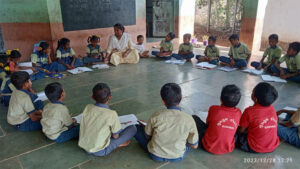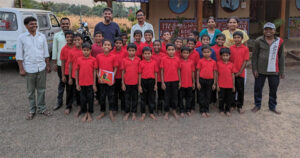- About 42 children aged 8 years to 14 years, who are orphan or single-parent children from tribal families, are currently residents of two hostels namely, ‘Arpan’ & ‘Gurukul’ managed by Aashray
- The KRSF teachers not only impart education and mentoring to the students, but also employ experiential learning to clear key concepts
- Time and again, KRSF has forged collaborations with several other institutions working in different sectors and different regions towards addressing a range of social issues, for the greater good of the society: Uday Desai, President, KRSF
- KRSF has not only helped us scale-up and amplify our efforts but also had a positive impact on the community as a whole with their integrated approach on education, livelihoods and sustainability: Mohanbhai Laxmandas Mangla of Aashray Charitable Trust
NE EDUCATION BUREAU
AHMEDABAD, DEC 28
In a unique initiative, Dr KR Shroff Foundation (KRSF) has partnered with South Gujarat-based Aashray Charitable Trust (Aashray) to holistically empower and transform the lives of underprivileged and orphan children in the remote village of Dabkhal, in Kaprada taluka of Valsad district.

KRSF has joined in to uplift the lives of these children, who stay in two hostels operated by Aashray in Dabkhal village, which is located in the tribal belt on the Gujarat-Maharashtra border, and attend the local government primary school and high schools in the vicinity. In line with its philosophy, KRSF is working tirelessly over the last 6 months towards bringing about transformation in these children by improving academic outcomes in key learning parameters of reading, writing and mathematics, along with priming them for modern agricultural practices by way of vocational training.
About 42 children aged 8 years to 14 years, who are orphan or single-parent children from tribal families, are currently residents of two hostels namely, ‘Arpan’ & ‘Gurukul’ managed by Aashray. These hostels, located far from the hustle bustle and economic activity of Gujarat’s urban centers, found it to be a constant struggle to garner funds and scale up their operations; which is when KRSF partnered with Aashray not only to improve the education delivery and learning of the students, but also providing requisite funding and helping the hostels achieve financial independence by introducing sustainable livelihood practices.

It is important to note that these childrens’ learning issues were exacerbated by the fact that the children speak and understand a local dialect which is a mix of Gujarati and Marathi, which made it difficult for them to read and write in Gujarati, and understand textbooks in Gujarati. To address these issues, KRSF conducted intensive Teachers’ Training to greatly improve the education delivery and improve learning outcomes of these students and bring them at par with curriculum of their respective classes. The KRSF teachers not only impart education and mentoring to the students, but also employ experiential learning to clear key concepts. In addition to this KRSF constantly assesses the learning and skill levels of students, both at the school(s) and the hostel, by regular measurement and monitoring using education management techniques.
Speaking on the initiative, Uday Desai, President, KRSF, said, “Time and again, KRSF has forged collaborations with several other institutions working in different sectors and different regions towards addressing a range of social issues, for the greater good of the society. For more than a decade, KRSF has worked relentlessly to improve the quality of education in rural Gujarat. Through this collaboration with Aashray Charitable Trust, our foundation is able to penetrate deeper into geographies where we haven’t worked before and also identify the core problems of students and the community in the region to make their lives better and empower them to be self-reliant.”
KRSF also provides funding and training for teachers to deliver value-based education to students. The team of teachers at KRSF regularly conduct special classes to impart health and hygiene lessons to children, teaching them how to maintain personal cleanliness and hygiene. This has led to a significant change in children. In fact, KRSF’s mentoring of the students has proved transformational, giving a new outlook to their education and future.
In a bid to bring about all-round development, KRSF has also introduced vocational training for modern agricultural practices, by way of organic farming in the hostel campuses. After months of efforts, the students of the hostels are now harvesting fresh, organic produce like spinach, amaranthus, fenugreek and many vegetables for their own consumption. KRSF has also trained the hostel employees for setting up a kitchen garden and nursery. The hostel staff learnt on how to maintain the soil and techniques on how to plant, nurture and harvesting vegetables. As a result, the food costs of the hostels have been reduced significantly, which also paves the way for these hostels towards being self-reliant and financially independent. Apart from this, KRSF also provides food and ration, along with funding support for salaries of the employees of the hostels.
“It is an honour to collaborate with a committed organisation like KRSF which has worked towards uplift of rural communities and empowering them with education and other interventions. Through KRSF’s efforts, our organisation functions much more systematically. We have observed a visible difference in the basic reading-writing and maths skills of students here after KRSF’s intervention. KRSF has not only helped us scale-up and amplify our efforts but also had a positive impact on the community as a whole with their integrated approach on education, livelihoods and sustainability,” said Mohanbhai Laxmandas Mangla of Aashray Charitable Trust.
With further assistance from KRSF, Aashray Charitable Trust also plans to undertake several initiatives in the future, including skill development for ‘Gruh Udyog’, irrigation and water conservation.
Over the past decade, KRSF has been relentlessly and successfully working towards bringing about a measurable change in improving the quality of education across some 665 rural schools in 650 villages of Gujarat.












